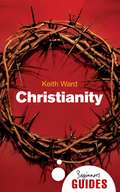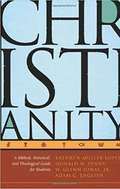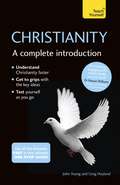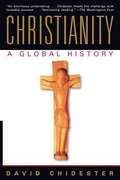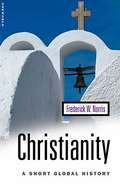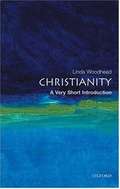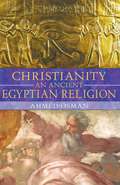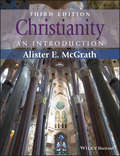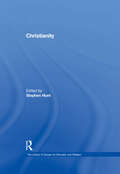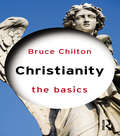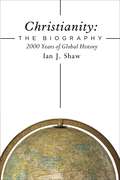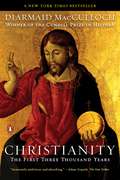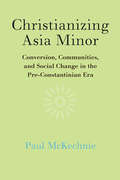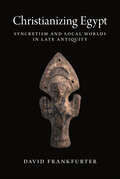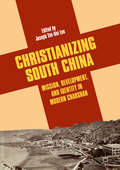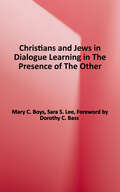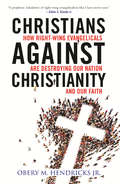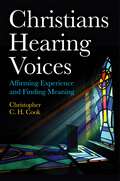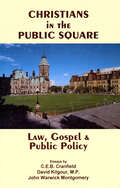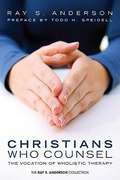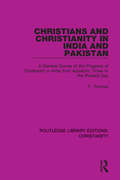- Table View
- List View
Christianity: A Beginner's Guide (Beginner's Guides)
by Keith WardWith over two billion adherents worldwide, Christianity is the world's largest religion. However, with a multitude of denominations, and a huge variety of opinions on many of its central tenets, it can be difficult to obtain a balanced overview of the faith. Renowned theologian and bestselling author Keith Ward draws from his vast array of experience and knowledge to provide a unique and authoritative introduction for the simply curious and for those seeking a deeper understanding of this complex faith. Examining differing Christian perspectives on fifteen major themes which range from Creation to conceptions of the Trinity, Ward reveals a religion which is united by a common belief, despite being stunningly multifaceted, as he encourages readers to think creatively about a tradition whose impact has been felt in the most remote areas of the planet.
Christianity: A Biblical, Historical, and Theological Guide for Students
by Adam C. English Kathryn Muller Lopez Donald N. Penny W. Glenn JonasOffers students with a general introduction to the Christian religion, focusing on the biblical, historical, and theological traditions within Christianity. This book explores the Old Testament, and provides an overview of the New Testament. It also covers Christian history from the early centuries onwards.
Christianity: A Complete Introduction: Teach Yourself
by John Young Greg Hoyland'An exciting, engaging and intellectually serious book' Dr Rowan Williams, 104th Archbishop of Canterbury 'I think it's brilliant!' Bishop Stephen CottrellHow is it that a faith that began in 1st century Palestine with a handful of followers has become the largest movement the world has ever known? Christianity: A Complete Introduction traces the story of the Christian faith from sandals to cyberspace. It describes the origins and key ideas of Christianity and gives an account of how it looks in the modern world. Socially, scientifically, economically and politically, Christianity today inhabits a very different world from that of Jesus of Nazareth and his early disciples. Yet it seems to possess an inherent ability to survive and thrive in the face of great change. It remains a compelling and powerful faith in the modern world, with a rich and diverse heritage. Whether you are preparing for an essay, studying for an exam, or simply want to expand your knowledge, Christianity: A Complete Introduction is your go-to guide.
Christianity: A Global History
by David ChidesterDavid Chidester, one of the world's foremost scholars of religion, traces Christianity's growth and development from the time of Jesus to the dawn of the third millennium, revealing its rich diversity through the deeds and beliefs of heretics and saints, witches and healers, preachers and inquisitors. Chidester explores the emergence of the major streams of Christian thought and practice, distilling the cultural history of the Church and its impact on the world into this superbly readable book. Alongside this broad panorama is a richly human story that the author brilliantly encapsulates in incisive character sketches and historical vignettes. Christianity, in all its many facets, has been and continues to be one of the most influential forces in history. Chidester shows that this religion, with its roots deep in the ancient world, has always been in a constant state of evolution, affecting and affected by the religions and societies around it. At times Christianity has coexisted peacefully with other forms of belief, exchanging ideas and practices with them. At other times profound, even violent, conflict has arisen. In this book David Chidester intelligently and objectively portrays Christians in different times and places, as a minority and as the majority group, a religion both absorbing and resisting the world around it. Christianity reveals the religion as it was and is lived in the life of everyday people rather than focusing on the dry dogmas and beliefs that fill most histories. Chidester's accomplishment is to capture the complexity and grand sweep of this story in one remarkable volume that is destined to take its place as a classic of religious history.
Christianity: A Short Global History
by Frederick NorrisThe development of many key themes, including Christianity's relationships with other religions, and with diverse political powers.
Christianity: A Very Short Introduction
by Linda WoodheadChristianity: A Very Short Introduction offers a bold new overview of the world's largest religion. It takes as its theme contrasting types of power in Christianity - power as control and power as love. The book examines the competition for power between different forms of Christianity - church Christianity, monastic and mystical Christianity, and the different forms of modern Christianity. In doing so it offers an introduction to the main manifestations of Christianity, their key symbols, ideas and teachings, and their interaction with one another and with 'worldly' power. The book concludes by showing the increasing power of women and 'Third World' Christians in modern Christianity.
Christianity: A Very Short Introduction (Very Short Introductions)
by Linda WoodheadExploring the cultural and institutional dimensions of Christianity, and tracing its course over two millennia, Linda Woodhead provides a fresh, lively, and candid portrait of Christianity's past and present. Addressing topics including the competition for power between different forms of Christianity, the churches' use of power, and its struggles with modernity, this new edition includes up to date information on the growth and geographical spread of Eastern Christianity, reflecting the global nature of Christianity in our ever-shifting contemporary culture. At a time when Christianity is flourishing in the Southern hemisphere but declining in much of the West, this Very Short Introduction offers an important overview of the world's largest religion.
Christianity: An Ancient Egyptian Religion
by Ahmed OsmanContends that the roots of Christian belief come not from Judaea but from Egypt• Shows that the Romans fabricated their own version of Christianity and burned the Alexandrian library as a way of maintaining political power• Builds on the arguments of the author's previous books The Hebrew Pharaohs of Egypt, Moses and Akhenaten, and Jesus in the House of the PharaohsIn Christianity: An Ancient Egyptian Religion author Ahmed Osman contends that the roots of Christian belief spring not from Judaea but from Egypt. He compares the chronology of the Old Testament and its factual content with ancient Egyptian records to show that the major characters of the Hebrew scriptures--including Solomon, David, Moses, and Joshua--are based on Egyptian historical figures. He further suggests that not only were these personalities and the stories associated with them cultivated on the banks of the Nile, but the major tenets of Christian belief--the One God, the Trinity, the hierarchy of heaven, life after death, and the virgin birth--are all Egyptian in origin. He likewise provides a convincing argument that Jesus himself came out of Egypt.With the help of modern archaeological findings, Osman shows that Christianity survived as an Egyptian mystery cult until the fourth century A.D., when the Romans embarked on a mission of suppression and persecution. In A.D. 391 the Roman-appointed Bishop Theophilus led a mob into the Serapeum quarter of Alexandria and burned the Alexandrian library, destroying all records of the true Egyptian roots of Christianity. The Romans' version of Christianity, manufactured to maintain political power, claimed that Christianity originated in Judaea. In Christianity: An Ancient Egyptian Religion Osman restores Egypt to its rightful place in the history of Christianity.
Christianity: An Introduction (Wiley-blackwell Manifestos Ser.)
by Alister E. McGrathNow available in a fully-revised and updated new edition, this popular textbook by one of the world's leading theologians offers a lively, jargon-free introduction to Christianity. Features a wealth of new material on global Christianity, American Christianity, the Orthodox Church, current theological debates, and Christianity in relation to other world religions Includes enhanced and expanded student-friendly features, including numerous illustrations, suggestions for further reading, a glossary of Christian terms, and brief readings from primary Christian sources Written in an accessible and engaging style that assumes no prior knowledge of Christian beliefs or practices, making it an invaluable resource for beginners to the subject as well as those looking for a refresher Incorporates coverage of Catholicism, Orthodoxy, Protestantism, Evangelicalism, and Pentecostalism A glossary, related websites, and other resources from Dr. McGrath are available online at www.alistermcgrathwiley.com
Christianity: And Its Relations To Poetry And Philosophy (classic Reprint) (The Library of Essays on Sexuality and Religion)
by AuthorFor two millennia Christianity has embraced fairly consistent views of human sexuality. Today, there exist more varied outlooks on the subject. This volume on Christianity in the The Library of Essays on Sexuality and Religion series overviews the contrasting Christian perceptions of sexuality. Part 1 includes a number of previously published articles that are theological in nature and present biblical interpretations of sexuality. Here, several Christian voices are permitted to speak from their varied perspectives, both conservative and liberal. Part 2 features contributions focusing on the Christian tradition of celibacy and asceticism. Part 3 surveys scholarly work emphasising the relationship between sexuality, gender and patriarchy. Part 4 offers academic interpretations of Christian expressions of sexuality through the mediums of worship, ritual and the sacraments. The final part peruses contemporary contestations of conventional Christian views. This is undertaken by presenting articles examining views of gay sexuality, assisted human reproduction and priestly celibacy.
Christianity: Bullet Guides
by Victor W WattonOpen this book and you will Discover core beliefs Understand basic teachings Learn about the Bible Trace its history
Christianity: Edexcel Gcse Religious Studies Religion And Life Through Christianity (unit 2) And Religion And Society (unit 8) (My Revision Notes Ser.)
by Victor W WattonOpen this book and you will Discover core beliefs Understand basic teachings Learn about the Bible Trace its history
Christianity: Teach Yourself
by John Young Greg Hoyland'An exciting, engaging and intellectually serious book' Dr Rowan Williams, 104th Archbishop of Canterbury 'I think it's brilliant!' Bishop Stephen CottrellHow is it that a faith that began in 1st century Palestine with a handful of followers has become the largest movement the world has ever known? Christianity: A Complete Introduction traces the story of the Christian faith from sandals to cyberspace. It describes the origins and key ideas of Christianity and gives an account of how it looks in the modern world. Socially, scientifically, economically and politically, Christianity today inhabits a very different world from that of Jesus of Nazareth and his early disciples. Yet it seems to possess an inherent ability to survive and thrive in the face of great change. It remains a compelling and powerful faith in the modern world, with a rich and diverse heritage. Whether you are preparing for an essay, studying for an exam, or simply want to expand your knowledge, Christianity: A Complete Introduction is your go-to guide.'An exciting, engaging and intellectually serious book that gives a really comprehensive picture of how Christians behave, what they think and how they believe their faith makes a difference in today's world. A first class survey of doctrine and history along with a sympathetic account of prayer and ethics as Christians understand them' Dr Rowan Williams, 104th Archbishop of Canterbury 'I think it's brilliant! Whether you are a preacher, pastor, student or enquirer, this exceptionally useful book will often be your first port of call' Bishop Stephen Cottrell
Christianity: The Basics (The Basics)
by Bruce ChiltonChristianity: The Basics is a compelling introduction to both the central pillars of the Christian faith and the rich and varied history of this most global of global religions. This book traces the development of Christianity through an exploration of some of the key beliefs, practices and emotions which have been recurrent symbols through the centuries: Christ, the kingdom of heaven and sin Baptism, Eucharist and prayer Joy, divine union and self denial Encompassing the major epochs of Christian history and examining the unity and divisions created by these symbols, Christianity: The Basics is both a concise and comprehensive introduction to the Christian tradition.
Christianity: The Biography
by Ian J. Shaw<P>In Christianity: The Biography Ian Shaw charts the story of Christianity from its birth and infancy among a handful of followers of Jesus Christ, through its years of development into a global religious movement, spanning continents and cultures and transcending educational and social backgrounds.<P> This new, accessible overview of the global history of Christianity: Narrates the story of the Christian tradition and its global heritage over two millennia Introduces the major phases, developments, movements, and personalities Explores interactions of Christianity with the wider society Is written from within the evangelical tradition, but accessible to others Presents nuanced, cogent analysis that draws on the latest scholarship
Christianity: The First Three Thousand Years
by Diarmaid MaccullochThe National Book Critics Circle Award-winning author of The Reformation returns with the definitive history of Christianity for our time <P> Once in a generation a historian will redefine his field, producing a book that demands to be read-a product of electrifying scholarship conveyed with commanding skill. Diarmaid MacCulloch's Christianity is such a book. Breathtaking in ambition, it ranges back to the origins of the Hebrew Bible and covers the world, following the three main strands of the Christian faith. Christianity will teach modern readers things that have been lost in time about how Jesus' message spread and how the New Testament was formed. We follow the Christian story to all corners of the globe, filling in often neglected accounts of conversions and confrontations in Africa and Asia. And we discover the roots of the faith that galvanized America, charting the rise of the evangelical movement from its origins in Germany and England. This book encompasses all of intellectual history-we meet monks and crusaders, heretics and saints, slave traders and abolitionists, and discover Christianity's essential role in driving the enlightenment and the age of exploration, and shaping the course of World War I and World War II. We are living in a time of tremendous religious awareness, when both believers and non-believers are deeply engaged by questions of religion and tradition, seeking to understand the violence sometimes perpetrated in the name of God. The son of an Anglican clergyman, MacCulloch writes with deep feeling about faith. His last book, The Reformation, was chosen by dozens of publications as Best Book of the Year and won the National Book Critics Circle Award. This awe-inspiring follow-up is a landmark new history of the faith that continues to shape the world.
Christianizing Asia Minor: Conversion, Communities, and Social Change in the Pre-Constantinian Era
by Paul McKechniePaul McKechnie explores how Christianity grew and expanded in Roman Asia over the first three centuries of the religion. Focusing on key individuals, such as Aberkios (Avircius Marcellus) of Hierapolis, he assesses the pivotal role played by Early Christian preachers who, in imitation of Paul of Tarsus, attracted converts through charismatic preaching. By the early fourth century, they had brought many cities and rural communities to a tipping point at which they were ready to move under a 'Christian canopy' and push polytheistic Greco-Roman religion to the margins. This volume brings new clarity of our understanding of how the Christian church grew and thrived in Asia Minor, simultaneously changing Roman society and being changed by it. Combining patristic evidence with the archaeological and epigraphic record, McKechnie's study creates a strong factual and chronological framework to the study of Christianization, while bringing Church History and Roman history more closely together.
Christianizing Egypt: Syncretism and Local Worlds in Late Antiquity (Martin Classical Lectures)
by David FrankfurterHow does a culture become Christian, especially one that is heir to such ancient traditions and spectacular monuments as Egypt? This book offers a new model for envisioning the process of Christianization by looking at the construction of Christianity in the various social and creative worlds active in Egyptian culture during late antiquity.As David Frankfurter shows, members of these different social and creative worlds came to create different forms of Christianity according to their specific interests, their traditional idioms, and their sense of what the religion could offer. Reintroducing the term “syncretism” for the inevitable and continuous process by which a religion is acculturated, the book addresses the various formations of Egyptian Christianity that developed in the domestic sphere, the worlds of holy men and saints’ shrines, the work of craftsmen and artisans, the culture of monastic scribes, and the reimagination of the landscape itself, through processions, architecture, and the potent remains of the past.Drawing on sermons and magical texts, saints’ lives and figurines, letters and amulets, and comparisons with Christianization elsewhere in the Roman empire and beyond, Christianizing Egypt reconceives religious change—from the “conversion” of hearts and minds to the selective incorporation and application of strategies for protection, authority, and efficacy, and for imagining the environment.
Christianizing South China: Mission, Development, And Identity In Modern Chaoshan
by Joseph Tse-Hei LeeChristianity flourishes in areas facing profound dislocations amidst regime change and warfare. This book explains the appeal of Christianity in the Chaozhou-Shantou (Chaoshan) region during a time of transition, from a stage of disintegration in the late imperial era into the cosmopolitan and entrepreneurial area it is today. The authors argue that Christianity played multiple roles in Chaoshan, facilitating mutual accommodations and adaptations among foreign missionaries and native converts. The trajectory of Christianization should be understood as a process of civilizational change that inspired individuals and communities to construct a sacred order capable of empowerment in times of chaos and confusion.
Christians & Jews in Dialogue: Learning in the Presence of the Other
by Mary C. Boys Sara S. LeeDiscover the Power of Dialogue to Heal Religious Division How can members of different faith traditions approach each other with openness and respect? How can they confront the painful conflicts in their history and overcome theological misconceptions? For more than twenty years, Professors Mary C. Boys and Sara S. Lee have explored ways that Catholics and Jews might overcome mistrust and misunderstandings in order to promote commitment to religious pluralism. At its best, interreligious dialogue entails not simply learning about the other from the safety of one’s own faith community, but rather engaging in specific learning activities with members of the other faith―learning in the presence of the other. Drawing upon examples from their own experience, Boys and Lee lay out a framework for engaging the religious other in depth. With vision and insight, they discuss ways of fostering relationships among participants and with key texts, beliefs, and practices of the other’s tradition. In this groundbreaking resource, they offer a guide for members of any faith tradition who want to move beyond the rhetoric of interfaith dialogue and into the demanding yet richly rewarding work of developing new understandings of the religious other―and of one’s own tradition.
Christians Against Christianity: How Right-Wing Evangelicals Are Destroying Our Nation and Our Faith
by Obery M. HendricksA timely and galvanizing work that examines how right-wing evangelical Christians have veered from an admirable faith to a pernicious, destructive ideology. Today&’s right-wing Evangelical Christianity stands as the very antithesis of the message of Jesus Christ. In his new book, Christians Against Christianity, best-selling author and religious scholar Obery M. Hendricks Jr. challenges right-wing evangelicals on the terrain of their own religious claims, exposing the falsehoods, contradictions, and misuses of the Bible that are embedded in their rabid homophobia, their poorly veiled racism and demonizing of immigrants and Muslims, and their ungodly alliance with big business against the interests of American workers. He scathingly indicts the religious leaders who helped facilitate the rise of the notoriously unchristian Donald Trump, likening them to the &“court jesters&” and hypocritical priestly sycophants of bygone eras who unquestioningly supported their sovereigns&’ every act, no matter how hateful or destructive to those they were supposed to serve. In the wake of the deadly insurrectionist attack on the US Capitol, Christians Against Christianity is a clarion call to stand up to the hypocrisy of the evangelical Right, as well as a guide for Christians to return their faith to the life-affirming message that Jesus brought and died for. What Hendricks offers is a provocative diagnosis, an urgent warning that right-wing evangelicals&’ aspirations for Christian nationalist supremacy are a looming threat, not only to Christian decency but to democracy itself. What they offer to America is anything but good news.
Christians Hearing Voices: Affirming Experience and Finding Meaning
by Christopher C. CookIn this insightful book, accounts of voice hearers are presented, evaluated and interpreted by a Christian theologian and psychiatrist. By listening to the first-hand experiences of voice hearers and evaluating them in the light of Christian theology, the book enables the reader to understand the experiences of voice hearers as a part of Christian experience and to engage with the theological issues raised by them, including the nature of revelation. This engaging and thought-provoking collection looks at a range of stories - ranging from comforting to complex to simply conversational - to encourage debate and search for meaning and also show how the reader can adapt clinical and pastoral practice to better aid people in this situation.
Christians In The Public Square: Law, Gospel, & Public Policy
by John Warwick MontgomeryThis collection of articles examining the inter-relationship between "law" and "gospel"; what a Christian should and should not attempt to do in the public realm of politics; and bioethical issues. Included are essays by David Kilgour, one of Canada's longest serving Members of Parliament, providing the perspective of a practicing politician; and theologian C. E. B. Cranfield on the New Testament's teaching.
Christians Who Counsel: The Vocation Of Wholistic Therapy
by Ray S. Anderson Todd H. SpeidellHow does one view Christian counseling as a calling? What is the role and task of the counselor from a theological perspective? How does one strip away the ambiguity that is too often inherent in the words therapy and counseling in a religious setting? Ray S. Anderson has written this book as a theologian with a keen interest in helping Christian counselors fulfill their task more effectively by enabling them to see that task more clearly. Too often, even counselors who achieve effective results are beset by what Anderson calls an uneasy conscience--the realization that for some reason a little transactional analysis once a week works better than a month of Sundays in curing the souls of troubled parishioners. This book seeks to put that uneasiness and ambiguity to rest by helping counselors see their work as a means of grace, rooted in a model of personhood that is both theologically and psychologically sound for realizing the full potential of each person. Christians Who Counsel has three parts, involving building a foundation for Christian counseling, exploring the spiritual dynamics in counseling, and describing counseling in a distinctly Christian mode. Written without either theological or psychological jargon, this book is for all Christians who counsel, whether pastors, lay counselors, psychotherapists, or family therapists. With clarity of vision comes the power of a renewed commitment.
Christians and Christianity in India and Pakistan: A General Survey of the Progress of Christianity in India from Apostolic Times to the Present Day
by P. ThomasOriginally published in 1954, Christians and Christianity in India and Pakistan is an historical account of Christianity from the time of Apostle Thomas through to contemporary times. The book records the vicissitudes of the Church prior to the Reformation, the work of the early Protestant missions, and the results of British influence. It provides an overview of Christianity in contemporary India and Pakistan, and explores a range of topics including Indian traditions, the labours of Armenians and the missionaries of the West, the political and social position of Indian Christians, and Christian influences on Hinduism. Christians and Christianity in India and Pakistan will appeal to those with an interest in the history of Christianity.
